|
|
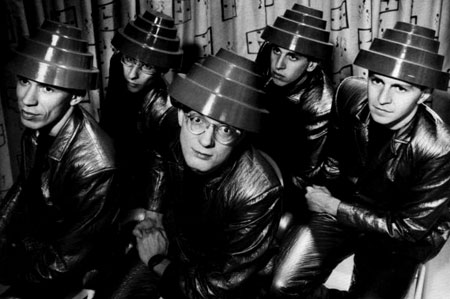
BACK ON TARGET:
DEVO LIVE IN 1980
By Hollis James
Video artist Joe Rees founded Target Video in 1978 to capture what he correctly saw as an “alternative musical movement” that was
steadily overtaking album-oriented rock. From punk royalty such as the Ramones and Talking Heads to sadly unrecorded
“might-have-beens” like the Dils and the Screamers, Target began documenting every cutting-edge band playing clubs, bars, parties,
Joe’s art studio (known simply as “Target,”) and even venues that defy logic—such as the Cramps’ 1979 show at
Napa State Mental Hospital. In the pre-MTV years, the good people from Target captured sublime historical documents of
now-indisputable musical legends. Even a cursory glance at Target’s recorded roster is intimidating, boasting Iggy Pop,
Bad Brains, Minor Threat, the Cramps, Dead Kennedys, the Stranglers and even GG Allin. Unfortunately, once Target disappeared,
many of us could only track down these gems as tenth-generation bootlegs. Luckily the digital age has been kind to the once
VHS-only company. No longer the ROIR of the home-video market, Target—with the help of Music Video Distributors—has put care
and (finally!) money into preserving its library of rare video-concert footage on DVD. The Target closet is full of worthy
candidates for analog-to-digital transfers, hopefully with retooled sound that at least approaches today’s standards. But of
all the important acts whose Target concerts are slowly emerging in DVD form, only Devo combines the visual punch equal to—and
at times superceding—its sonic gifts. In short, this band anticipated, was designed for, and hence thrives in the digital age.
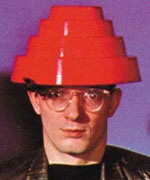 For the uninitiated, the difference between Devo and those other denizens of the man-as-machine microcosm, Kraftwerk, is that
Kraftwerk are men whose raison d’etra has been to musically document their systematic evolution from instrument-playing men into
the highest non-life-forms: music machines. But while Kraftwerk pursued a higher automaton existence, Devo “de-evolved.” Devo’s
name and inspiration were derived from Oscar Kiss Maerth's, The Beginning Was the End,” an oddly learned yet hopelessly
bent thesis, which posited that the rise of man was, in essence, an evolutionary accident caused by a mutated group of brain-eating,
nymphomaniac apes. Hence the devolution began. This metaphor is carried throughout Devo's work as a commentary on the
dehumanization of modern society. Devo were childlike in the most commercially dangerous way, pushing their luck in whichever
direction ensured the most resistance—sonic art-terrorists spoiling for a fight. Devo has always worked from the starting point
that the beginning was the end. Quite frankly, from a creative standpoint, where could that possibly lead? Luckily, Devo wouldn’t
have to choose for a few years yet.
For the uninitiated, the difference between Devo and those other denizens of the man-as-machine microcosm, Kraftwerk, is that
Kraftwerk are men whose raison d’etra has been to musically document their systematic evolution from instrument-playing men into
the highest non-life-forms: music machines. But while Kraftwerk pursued a higher automaton existence, Devo “de-evolved.” Devo’s
name and inspiration were derived from Oscar Kiss Maerth's, The Beginning Was the End,” an oddly learned yet hopelessly
bent thesis, which posited that the rise of man was, in essence, an evolutionary accident caused by a mutated group of brain-eating,
nymphomaniac apes. Hence the devolution began. This metaphor is carried throughout Devo's work as a commentary on the
dehumanization of modern society. Devo were childlike in the most commercially dangerous way, pushing their luck in whichever
direction ensured the most resistance—sonic art-terrorists spoiling for a fight. Devo has always worked from the starting point
that the beginning was the end. Quite frankly, from a creative standpoint, where could that possibly lead? Luckily, Devo wouldn’t
have to choose for a few years yet.
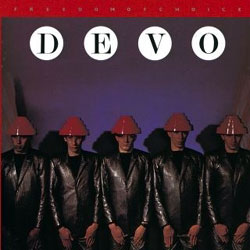 Long available only on out of print VHS or on harder and harder to find vinyl, this brand new DVD release—with the help of the
right distributor, MVD—looks and sounds better than ever before. To give you an idea of the Devo that's captured live here, on tour in
support of their breakthrough album, Freedom of Choice, the band opens the show with “Whip It.” A few of you may say,
‘Oh, sure, their hit.' But the fact that they open with their “one hit wonder,” proves that, at that point, “Whip It” was not
yet a hit, let alone a wonder. The band had no idea that “Whip It” was about to become the one song that would overshadow all
others (including better ones!) they would ever write. But by the time this tour ended, “Whip It” was coming out of every radio and TV
in America. Even Casey “Reach for the Stars” Kasem would be forced to utter the name of Devo. Unfortunately the band’s visual
appeal was so intriguing it cast a wider shadow, at times, than their music. What’s forgotten by most, is that this was a band
widely respected by their peers, who were quick to “get the joke” a lot sooner than the public or critics. Most people don’t
know that Brian Eno produced their debut record, Q: Are We Not Men? A: We Are Devo!, or, even more tellingly, that
Warner Brothers only signed the band at the insistence of both David Bowie and Iggy Pop. Each championed the band after seeing
Devo’s short film, The Truth About De-Evolution. In fact, Bowie was originally supposed to produce their debut album
until a scheduling conflict forced him to bow out and Eno came onboard. Nice “fall-back” producer, huh? Devo had already been
playing gigs and paying dues since 1974, veterans of both the straight punk scene (such as Max’s Kansas City and The Crypt) and
the same art-rock circuit that spawned fellow envelope-pushers Oingo Boingo. By the time of this concert—at the Phoenix Theatre
in California, August 17, 1980—Devo were road-tested, self-assured and tight.
Long available only on out of print VHS or on harder and harder to find vinyl, this brand new DVD release—with the help of the
right distributor, MVD—looks and sounds better than ever before. To give you an idea of the Devo that's captured live here, on tour in
support of their breakthrough album, Freedom of Choice, the band opens the show with “Whip It.” A few of you may say,
‘Oh, sure, their hit.' But the fact that they open with their “one hit wonder,” proves that, at that point, “Whip It” was not
yet a hit, let alone a wonder. The band had no idea that “Whip It” was about to become the one song that would overshadow all
others (including better ones!) they would ever write. But by the time this tour ended, “Whip It” was coming out of every radio and TV
in America. Even Casey “Reach for the Stars” Kasem would be forced to utter the name of Devo. Unfortunately the band’s visual
appeal was so intriguing it cast a wider shadow, at times, than their music. What’s forgotten by most, is that this was a band
widely respected by their peers, who were quick to “get the joke” a lot sooner than the public or critics. Most people don’t
know that Brian Eno produced their debut record, Q: Are We Not Men? A: We Are Devo!, or, even more tellingly, that
Warner Brothers only signed the band at the insistence of both David Bowie and Iggy Pop. Each championed the band after seeing
Devo’s short film, The Truth About De-Evolution. In fact, Bowie was originally supposed to produce their debut album
until a scheduling conflict forced him to bow out and Eno came onboard. Nice “fall-back” producer, huh? Devo had already been
playing gigs and paying dues since 1974, veterans of both the straight punk scene (such as Max’s Kansas City and The Crypt) and
the same art-rock circuit that spawned fellow envelope-pushers Oingo Boingo. By the time of this concert—at the Phoenix Theatre
in California, August 17, 1980—Devo were road-tested, self-assured and tight.
For a band that took an almost militant stance toward conformity—(What other band has had members called Bob I and
Bob II?)—Target’s DVD provides a rare glimpse at the individual talents of Devo’s members. We see not only the obvious
contributions of main songwriters Gerald V. Casale and Mark Mothersbaugh, but the further musical and vocal contributions
of Devo’s unsung three—both Bobs (Casale & Mothersbaugh) and drummer Alan Myers. Oh, I suppose you knew that guitarist Bob I
sang lead on “Secret Agent Man?” I thought not! One happy discovery made during the viewing of this DVD, is that Devo’s
Alan Myers was one of the best drummers around. Since a rock drummer’s greatest gift is considered the ability to keep precise
time and hit hard, why didn’t this dynamic human metronome ever get his due? Well, for a band that used so many technical
doohickeys and self-made instruments to achieve mechanized mutant-ear candy, perhaps many just assumed that the drums were
made by machine. Today we’re so spoiled by the disposable shortcuts of the P. Diddies of the world that it’s hard to remember
when drummers could achieve such perverse pounding precision on their own. Regardless, Myers—not unlike fellow spitfire
skin-sizzlers Stephen Morris (Joy Division) or Kevin Haskins (Bauhaus)—impresses not only for the organic groove he creates
but also for the non-robotic raucousness he manages to assimilate into the rigid musical borders given him. In fact, this
visual document will act as proof to anyone who believes that these stiff-limbed pseudo-clones are not feeling the
music they’re playing. One need only witness Bob Mothersbaugh play his smoking guitar solos (especially in “Be Stiff” and the
cluster-fuck transition in “Smart Patrol/Mr. DNA”)—rapt in his own world, his body helplessly jerking back and forth in very
(un-Devo) spasmodic convulsions—as proof positive that beneath the five matching jumpsuits (and matching T-shirts and, I
assume, matching pectorals) beat five very real hearts. De-evolved mutated hearts, to be sure, but hearts just the same.
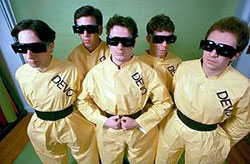 The concert features a killer set list (roughly 20 songs!), delivered with whiplash aggression. Devo’s greatest breakup song,
“Snowball,” their attempt at teen angst, “Girl U Want,” and their puzzlingly earnest attempt at homage,
“I Can’t Get No Satisfaction” are imbued with an infectious sense of vigor in concert that their album versions couldn’t
capture. “Be Stiff” alone is played at almost twice its earlier recorded speed. The bass line to “Mongoloid” almost lays
down the blueprint for the hardcore scene about to explode across America. Keep in mind that by the time of this concert
Devo had been touring for roughly six years. Unknown to the teenage fans at the Phoenix, the “overnight sensation” they’re
observing is a band who, having shaken off the dead skin of art-rock, seem to be cherishing the freedom their newfound
choice of hook-laden power-pop affords them.
The concert features a killer set list (roughly 20 songs!), delivered with whiplash aggression. Devo’s greatest breakup song,
“Snowball,” their attempt at teen angst, “Girl U Want,” and their puzzlingly earnest attempt at homage,
“I Can’t Get No Satisfaction” are imbued with an infectious sense of vigor in concert that their album versions couldn’t
capture. “Be Stiff” alone is played at almost twice its earlier recorded speed. The bass line to “Mongoloid” almost lays
down the blueprint for the hardcore scene about to explode across America. Keep in mind that by the time of this concert
Devo had been touring for roughly six years. Unknown to the teenage fans at the Phoenix, the “overnight sensation” they’re
observing is a band who, having shaken off the dead skin of art-rock, seem to be cherishing the freedom their newfound
choice of hook-laden power-pop affords them.
From Devo’s disastrous Halloween 1975 gig opening for Sun Ra, where they easily cleared the room (and Sun Ra played one of
his best sets ever to an auditorium of empty chairs), to this triumphant night merely five years later shows a massive
evolution for these de-evolution zealots. To think, only two years later Devo would be playing their televised hearts out
on the “Muffy’s Bat Mitzvah” episode of Square Pegs, while—in between verses of “That’s Good”—Jami Gertz and
Sarah Jessica Parker played out the sickeningly saccharine plot of their acne-drama. Now that’s what I call ‘crossing over.’
This concert DVD is a rare glimpse of a band being born—and, in some respects, creatively peaking—almost before our eyes.
It is both the finish line in Devo’s long race from ironic art-project freak show to professional, touring band, as well
as the beginning of the end for a band whose burgeoning success would inevitably nudge them out of the controlled playing
field they carefully regimented for themselves. Where once Devo dared—or forced—audiences to simply react (positively
or negatively) to their art, Devo’s new object was merely to entertain…and they revel in it. As will you.
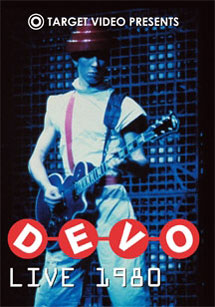 DEVO 1980:
DEVO 1980:
Gerald V. Casale vocals, bass, synthesizer bass
Mark Mothersbaugh vocals, keyboards, guitar
Bob Mothersbaugh (Bob I) vocals, lead guitar
Bob Casale (Bob II) rhythm guitar, keyboards
Alan Myers drums
DVD EXTRAS:
*The biggest joke Devo ever played on audiences would have truly made Andy Kaufman proud. The band would occasionally don
matching leisure suits (& sun visors!) and perform as their own opening act: a Christian soft-rock outfit named
“Dove: the Band of Love.” This disc boasts a rare clip of Dove in concert, performing two early Devo favorites,
“Praying Hands” and “Shrivel Up.” As a sun-visor-clad Gerald says before Dove launches into their first song, “Praise Jesus! Praise God!”
*Another great idea, which I hope we’ll see done more often, was to make this disc a flipside (one side video-concert DVD;
one side audio-concert CD). The folks at MVD knew that a concert disc with sound quality this good (yes, techies, it’s
in DOLBY) should not only also be playable on iPod, car stereo, boom box and discman, but easy to burn into your own mix CDs.
*Though technically not an “extra,” the opening Star Wars-style exposition crawl amusingly takes us back to the
night of the concert, 25 years ago, when these “five young men from an industrial wasteland known as Akron, Ohio,”
traveled thousands of miles to “make their presence known in a city by the water.” It’s odd to recall that back in
the halcyon days of punk’s hardcore elite (Dead Kennedys, Bad Brains, Husker Du, Minor Threat and, of course,
Reagan Youth, to name a few), the word Reagan became an appellative among bands—both figuratively and lyrically—to symbolize all that was wrong in the world.
That’s why I laughed aloud when I read the words, and again I quote: “The reign of President Reagan seems in retrospect
like a ray of sunshine compared to the present day rule of Emperor “W” and his fellow fundamentalist enemies around the
world.” DE-EVOLUTION IS REAL.
*After the concert, the cameras keep running (Good old Target!) to record the post-concert film their audience was
treated to, a surrealist video for the song "Tunnel of Love.” When “Tunnel of Love” ends the “Devo Corporate Anthem,” which
would surface on their album New Traditionalists, plays while Devo (clad in matching yellow
overalls and sunglasses) pledge allegiance to some unseen and distant flag. It’s nice to know that after three decades of
playing music together, Devo is still pledging allegiance to a flag that, for most of the world, remains unseen.
BUY IT!
WE’RE ALL DEVO! www.clubdevo.com
|
|
























 For the uninitiated, the difference between Devo and those other denizens of the man-as-machine microcosm, Kraftwerk, is that
Kraftwerk are men whose raison d’etra has been to musically document their systematic evolution from instrument-playing men into
the highest non-life-forms: music machines. But while Kraftwerk pursued a higher automaton existence, Devo “de-evolved.” Devo’s
name and inspiration were derived from Oscar Kiss Maerth's, The Beginning Was the End,” an oddly learned yet hopelessly
bent thesis, which posited that the rise of man was, in essence, an evolutionary accident caused by a mutated group of brain-eating,
nymphomaniac apes. Hence the devolution began. This metaphor is carried throughout Devo's work as a commentary on the
dehumanization of modern society. Devo were childlike in the most commercially dangerous way, pushing their luck in whichever
direction ensured the most resistance—sonic art-terrorists spoiling for a fight. Devo has always worked from the starting point
that the beginning was the end. Quite frankly, from a creative standpoint, where could that possibly lead? Luckily, Devo wouldn’t
have to choose for a few years yet.
For the uninitiated, the difference between Devo and those other denizens of the man-as-machine microcosm, Kraftwerk, is that
Kraftwerk are men whose raison d’etra has been to musically document their systematic evolution from instrument-playing men into
the highest non-life-forms: music machines. But while Kraftwerk pursued a higher automaton existence, Devo “de-evolved.” Devo’s
name and inspiration were derived from Oscar Kiss Maerth's, The Beginning Was the End,” an oddly learned yet hopelessly
bent thesis, which posited that the rise of man was, in essence, an evolutionary accident caused by a mutated group of brain-eating,
nymphomaniac apes. Hence the devolution began. This metaphor is carried throughout Devo's work as a commentary on the
dehumanization of modern society. Devo were childlike in the most commercially dangerous way, pushing their luck in whichever
direction ensured the most resistance—sonic art-terrorists spoiling for a fight. Devo has always worked from the starting point
that the beginning was the end. Quite frankly, from a creative standpoint, where could that possibly lead? Luckily, Devo wouldn’t
have to choose for a few years yet.
 Long available only on out of print VHS or on harder and harder to find vinyl, this brand new DVD release—with the help of the
right distributor, MVD—looks and sounds better than ever before. To give you an idea of the Devo that's captured live here, on tour in
support of their breakthrough album, Freedom of Choice, the band opens the show with “Whip It.” A few of you may say,
‘Oh, sure, their hit.' But the fact that they open with their “one hit wonder,” proves that, at that point, “Whip It” was not
yet a hit, let alone a wonder. The band had no idea that “Whip It” was about to become the one song that would overshadow all
others (including better ones!) they would ever write. But by the time this tour ended, “Whip It” was coming out of every radio and TV
in America. Even Casey “Reach for the Stars” Kasem would be forced to utter the name of Devo. Unfortunately the band’s visual
appeal was so intriguing it cast a wider shadow, at times, than their music. What’s forgotten by most, is that this was a band
widely respected by their peers, who were quick to “get the joke” a lot sooner than the public or critics. Most people don’t
know that Brian Eno produced their debut record, Q: Are We Not Men? A: We Are Devo!, or, even more tellingly, that
Warner Brothers only signed the band at the insistence of both David Bowie and Iggy Pop. Each championed the band after seeing
Devo’s short film, The Truth About De-Evolution. In fact, Bowie was originally supposed to produce their debut album
until a scheduling conflict forced him to bow out and Eno came onboard. Nice “fall-back” producer, huh? Devo had already been
playing gigs and paying dues since 1974, veterans of both the straight punk scene (such as Max’s Kansas City and The Crypt) and
the same art-rock circuit that spawned fellow envelope-pushers Oingo Boingo. By the time of this concert—at the Phoenix Theatre
in California, August 17, 1980—Devo were road-tested, self-assured and tight.
Long available only on out of print VHS or on harder and harder to find vinyl, this brand new DVD release—with the help of the
right distributor, MVD—looks and sounds better than ever before. To give you an idea of the Devo that's captured live here, on tour in
support of their breakthrough album, Freedom of Choice, the band opens the show with “Whip It.” A few of you may say,
‘Oh, sure, their hit.' But the fact that they open with their “one hit wonder,” proves that, at that point, “Whip It” was not
yet a hit, let alone a wonder. The band had no idea that “Whip It” was about to become the one song that would overshadow all
others (including better ones!) they would ever write. But by the time this tour ended, “Whip It” was coming out of every radio and TV
in America. Even Casey “Reach for the Stars” Kasem would be forced to utter the name of Devo. Unfortunately the band’s visual
appeal was so intriguing it cast a wider shadow, at times, than their music. What’s forgotten by most, is that this was a band
widely respected by their peers, who were quick to “get the joke” a lot sooner than the public or critics. Most people don’t
know that Brian Eno produced their debut record, Q: Are We Not Men? A: We Are Devo!, or, even more tellingly, that
Warner Brothers only signed the band at the insistence of both David Bowie and Iggy Pop. Each championed the band after seeing
Devo’s short film, The Truth About De-Evolution. In fact, Bowie was originally supposed to produce their debut album
until a scheduling conflict forced him to bow out and Eno came onboard. Nice “fall-back” producer, huh? Devo had already been
playing gigs and paying dues since 1974, veterans of both the straight punk scene (such as Max’s Kansas City and The Crypt) and
the same art-rock circuit that spawned fellow envelope-pushers Oingo Boingo. By the time of this concert—at the Phoenix Theatre
in California, August 17, 1980—Devo were road-tested, self-assured and tight.
 The concert features a killer set list (roughly 20 songs!), delivered with whiplash aggression. Devo’s greatest breakup song,
“Snowball,” their attempt at teen angst, “Girl U Want,” and their puzzlingly earnest attempt at homage,
“I Can’t Get No Satisfaction” are imbued with an infectious sense of vigor in concert that their album versions couldn’t
capture. “Be Stiff” alone is played at almost twice its earlier recorded speed. The bass line to “Mongoloid” almost lays
down the blueprint for the hardcore scene about to explode across America. Keep in mind that by the time of this concert
Devo had been touring for roughly six years. Unknown to the teenage fans at the Phoenix, the “overnight sensation” they’re
observing is a band who, having shaken off the dead skin of art-rock, seem to be cherishing the freedom their newfound
choice of hook-laden power-pop affords them.
The concert features a killer set list (roughly 20 songs!), delivered with whiplash aggression. Devo’s greatest breakup song,
“Snowball,” their attempt at teen angst, “Girl U Want,” and their puzzlingly earnest attempt at homage,
“I Can’t Get No Satisfaction” are imbued with an infectious sense of vigor in concert that their album versions couldn’t
capture. “Be Stiff” alone is played at almost twice its earlier recorded speed. The bass line to “Mongoloid” almost lays
down the blueprint for the hardcore scene about to explode across America. Keep in mind that by the time of this concert
Devo had been touring for roughly six years. Unknown to the teenage fans at the Phoenix, the “overnight sensation” they’re
observing is a band who, having shaken off the dead skin of art-rock, seem to be cherishing the freedom their newfound
choice of hook-laden power-pop affords them.
 DEVO 1980:
DEVO 1980:




















